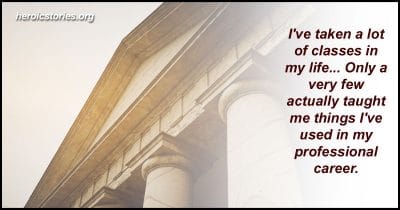by Barbara Crawford
Maryland, USA
I’ve taken a lot of classes in my life. Many were enjoyable, some were useful, some were tedious and some were just a waste of time. Only a very few actually taught me things I’ve used in my professional career.
The class that helped me more than any other was one I took from Dr. Dale Wright at Brigham Young University. He assigned us a list of landmark legal cases, and we had to read and prepare a brief on each one, then be prepared to present and defend it in front of the class.
The class was held in an amphitheater; seating was arranged in a semicircle leading down to a podium and a chalkboard. Dr. Wright called on one student to present the case assigned for that day, standing down at the front in what we called “the frying pan”.
After the presentation, the rest of us took turns questioning, critiquing, and commenting — trying to knock holes in the presenter’s argument. That session could be merciless. It was trial by fire, so you either got tough or got burned. The class was actually kind of fun, as long you weren’t the one called to present the case.
 Sometimes Dr. Wright would let the questions and comments continue after they became very heated. Even when the grilling got excessive, he never stopped it. No one actually cracked, but it seemed close a couple of times.
Sometimes Dr. Wright would let the questions and comments continue after they became very heated. Even when the grilling got excessive, he never stopped it. No one actually cracked, but it seemed close a couple of times.
As the semester went on, each student was called to present a case and field questions and comments. Those of us who weren’t called knew our day would come. By the last day of class, I was the only one who hadn’t been called to present, so everyone knew it was my turn. They knew I had prepared the assigned case, and some of my classmates were clearly looking forward to grilling me afterward. When Dr. Wright called on another student, there was a suppressed sense of outrage from most of the class. Students whispered to each other. I was relieved, but curious. Surely he knew I’d never had a turn in the frying pan.
After class, one student asked Dr. Wright why he had never called on me. Dr. Wright replied: “Barbara didn’t need it.” I didn’t think Dr. Wright knew any more about me than my name, but he clearly felt he did. His response was one of the finest compliments anyone had ever paid me.
With just four words, Dr. Wright showed he had confidence in me. His confidence, and my own, have stayed with me for the 19 years since I graduated. I’ve chaired committees, prepared and defended projects and given presentations to groups that were not predisposed to accept my proposals or requests.
But no matter how difficult the subject or audience, I’ve never had to back down. Those four words have carried me through many times and places. Thank you, Dr. Wright.
Podcast: Play in new window | Download (Duration: 4:06 — 3.8MB)


A beautiful and helpful story!
However, the seating arrangement described is not that of an amphitheater but that of a theater. I don’t understand why everybody – the BBC included – is making that mistake all the time. Perhaps it is because nobody is taking classical Greek anymore.
Fortunately the distinction has no impact on the story whatsoever. 🙂
Thomas I would love to learn more about this. I always thought amphitheater meant it was outdoors or “open air”. Wikipedia however, says that an amphitheater can also refer to “theatre-style stages with spectators seating only on one side.” I wonder if that’s the definition Barbara is using.
Why do you think it should be called a theater instead?
I remember when I was in fifth grade, my teacher would call on various people in the class to read aloud. I and another classmate never got called on (she never raised her hand, but I would volunteer every time and the teacher’s eyes would slide right off me). I asked her privately one day, around report card time, if I had done something wrong that she never called on me, and she seemed surprised. She pointed out that she called on me to answer questions all the time. When I explained that I was talking about reading out loud, she answered me in much the same way that Barbara’s teacher did: “I want to give people the chance to read out loud who aren’t very good at it, so they can get better.”
Nearly twenty years later (holy Moses) and I still try to carry that attitude with me.